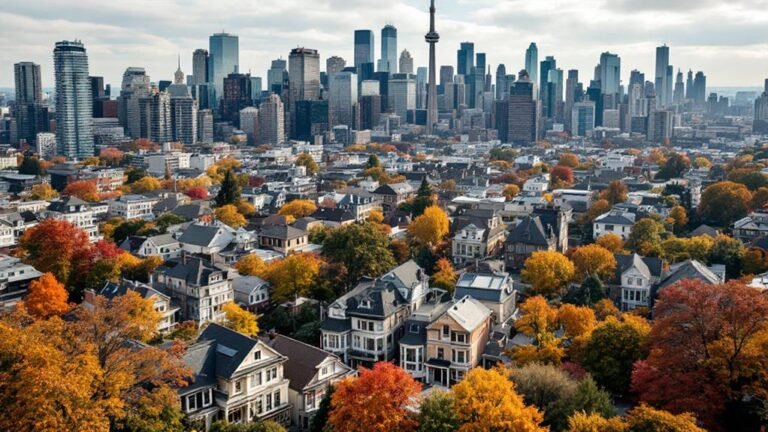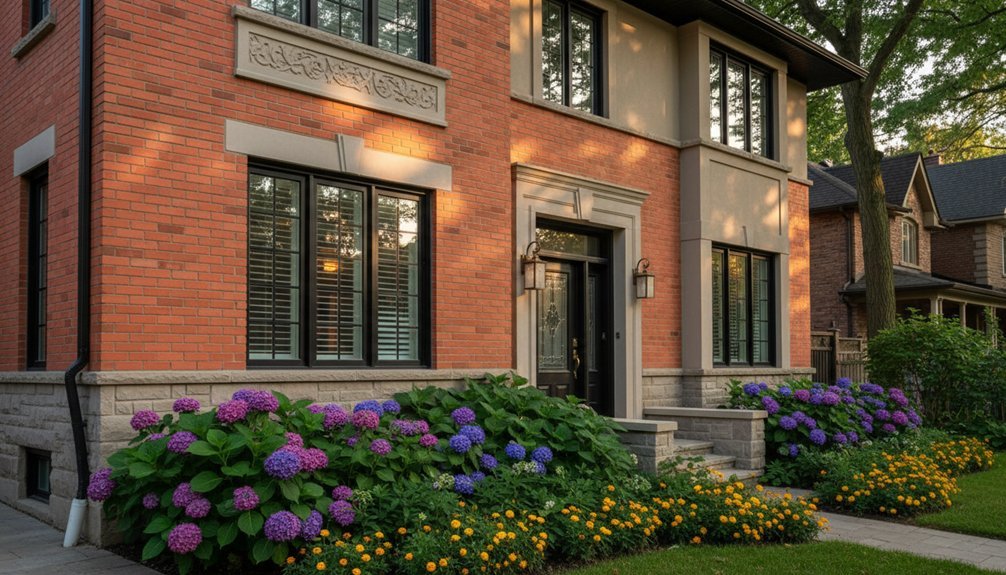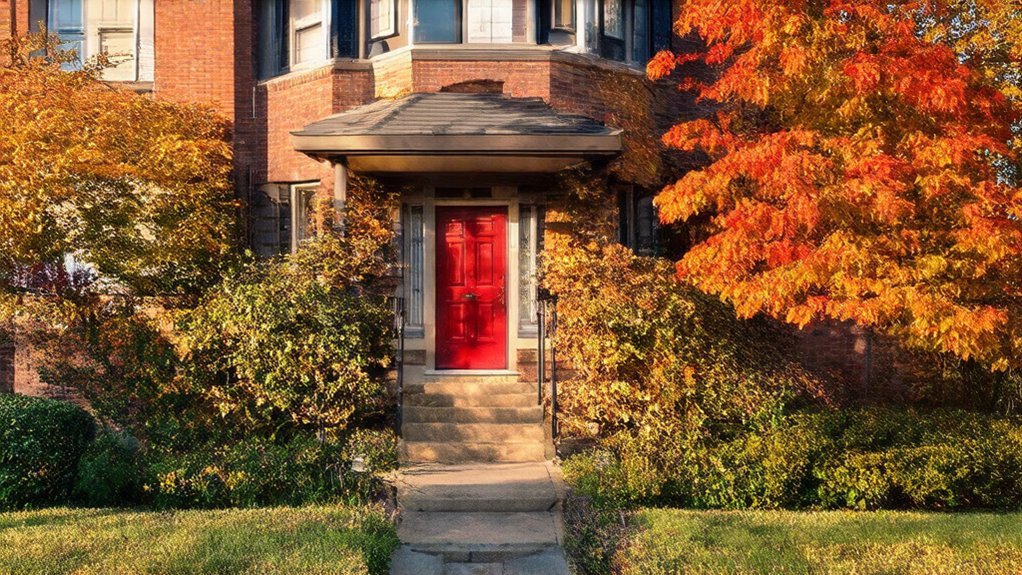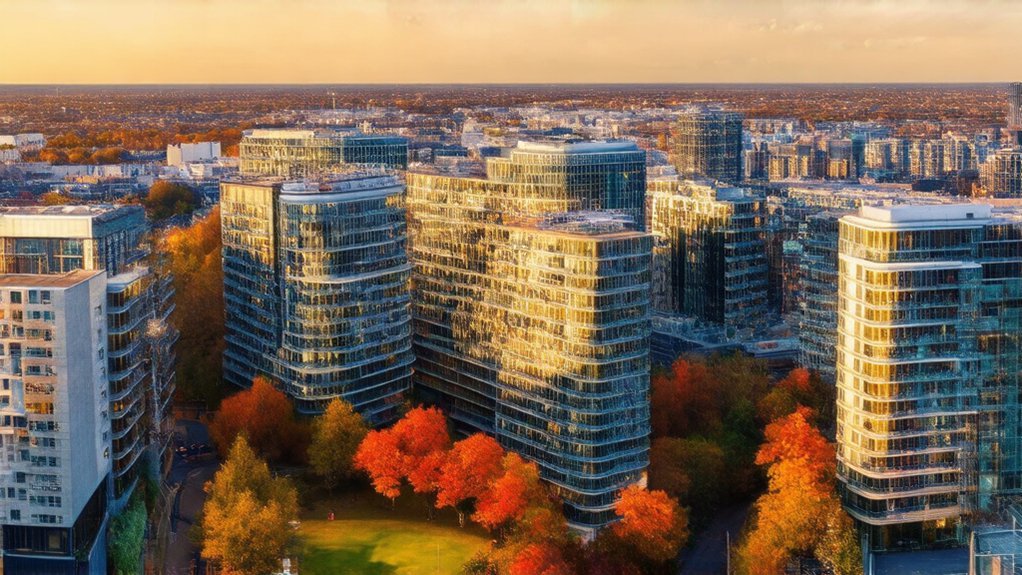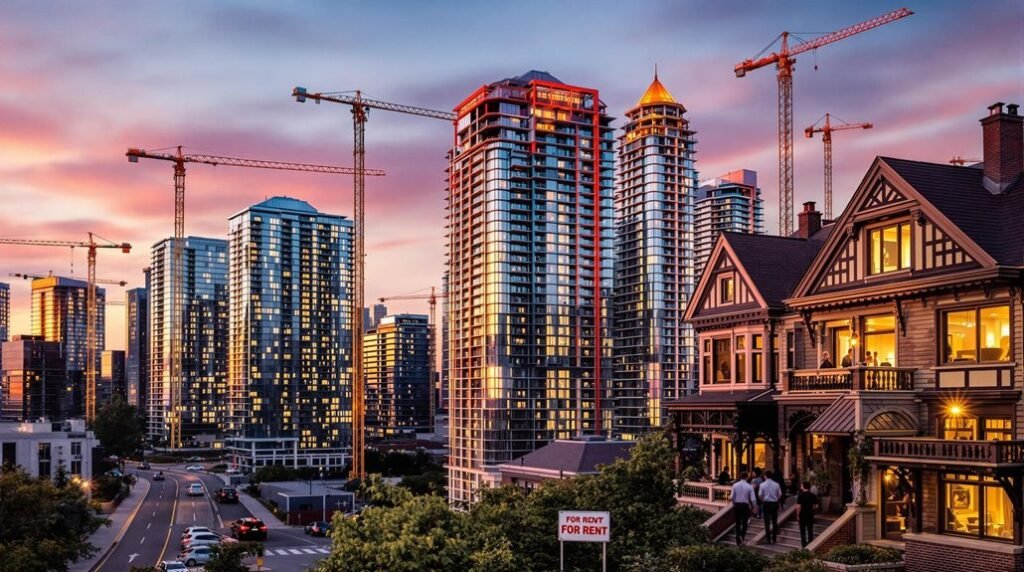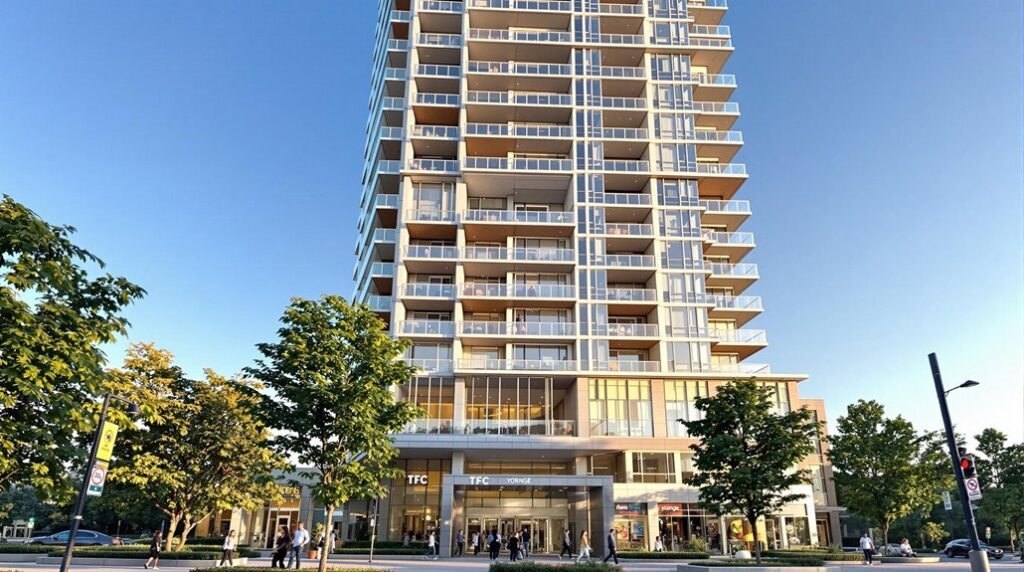If you’re contemplating purchasing your first home in Toronto, you’re about to venture on an exciting yet intricate journey. From evaluating your financial readiness to navigating the competitive real estate market, there’s a lot to ponder. You’ll need to understand mortgage options, explore neighborhoods, and master the art of making compelling offers. But don’t fret—with the right guidance, you can confidently tackle each step of the process. Whether you’re pondering about down payments or closing costs, this thorough guide will equip you with the knowledge you need. Ready to take the first step towards homeownership in one of Canada’s most vibrant cities?
Financial Preparation for First-Time Home Buyers in Toronto

As a first-time home buyer in Toronto, you’ll need to understand the minimum down payment requirements, which vary based on the property’s price. It’s important to familiarize yourself with these rules to make sure you’re financially prepared for your purchase. Beyond the down payment, you’ll want to create a detailed budget that accounts for the often-overlooked costs associated with buying a home in Toronto.
Minimum Down Payment Guide: What Toronto First-Time Buyers Need to Know
There’s one crucial element every Toronto first-time home buyer needs to understand: the minimum down payment required for their purchase. As you start on your financial planning journey, it’s vital to grasp the various down payment options available to you.
In Toronto’s dynamic real estate market, where market trends can shift rapidly, knowing the minimum requirements is essential. For homes priced at $500,000 or less, you’ll need to put down at least 5% of the purchase price. If you’re eyeing a property between $500,000 and $999,999, the minimum is 5% of the first $500,000, plus 10% of the remainder. For homes $1 million or more, you’re looking at a 20% minimum down payment.
Keep in mind that if your down payment is less than 20%, you’ll need mortgage loan insurance. However, as a first-time buyer, you might qualify for programs like the First-Time Home Buyer Incentive, potentially boosting your down payment by an additional 5-10%. Remember, these are just minimums. A larger down payment can significantly reduce your long-term mortgage costs and improve your approval odds. Always factor in additional expenses like closing costs and property taxes when planning your finances.
Hidden Costs of Buying a Home: Toronto First-Time Buyer’s Budget Checklist
When budgeting for your first home in Toronto, you’ll need to account for at least seven hidden costs beyond the purchase price. To ensure financial readiness, consider these often-overlooked expenses in your budget planning:
- Closing costs, including legal fees ($1000-$1500) and land transfer tax (with potential rebates for first-time buyers).
- Property appraisal fees ($350-$800) and building inspection fees (around $500 or more).
- Mortgage insurance premiums if your down payment is less than 20%.
- Sales tax on new properties (5-15% of the purchase price).
- Property taxes (approximately 0.666274% of the assessed value in Toronto for 2023).
- Homeowners’ insurance (about $100-200 per month in Ontario).
- Utilities, including hydro ($125-$200 per month) and water, sewage, and garbage ($600-$750 per year).
Don’t forget to factor in moving and decorating costs, as well as potential condo fees if applicable. By addressing these hidden expenses in your budget, you’ll be better prepared for the true cost of homeownership. Remember, thorough financial planning is essential for a successful first-time home purchase in Toronto’s competitive market.
Financial Assistance and Mortgage Pre-Approval
As a first-time home buyer in Toronto, you’ll want to explore financial assistance programs that can help make your purchase more affordable. Understanding the top programs available and how to access them is essential for your home-buying journey. Additionally, obtaining mortgage pre-approval is a key step you’ll need to take, and knowing the process can give you a significant advantage in Toronto’s competitive real estate market.
Top Financial Assistance Programs for Toronto First-Time Home Buyers
Financial relief awaits first-time home buyers in Toronto through several key assistance programs designed to ease the financial burden of purchasing a property. Two standout initiatives can significantly bolster your financial planning efforts: the Ontario Land Transfer Tax Refund and the First Home Savings Account (FHSA).
The Ontario Land Transfer Tax Refund offers up to $4,000 in savings for eligible buyers aged 18 and over, applicable to both new constructions and resale homes. You can claim this refund immediately during registration or later through the Ministry of Finance, providing immediate financial relief on closing costs.
The FHSA, a federal government program, enhances your savings strategies with tax benefits. You can contribute up to $8,000 annually, with a lifetime limit of $40,000. These contributions are tax-deductible, and the account offers flexibility in investment options, including stocks, bonds, and ETFs.
Step-by-Step: Getting Mortgage Pre-Approval as a Toronto First-Time Buyer
Now that you’re armed with knowledge about financial assistance programs, it’s time to tackle the next big step in your home-buying journey: getting pre-approved for a mortgage. In Toronto’s competitive market, pre-approval is essential for understanding your budget and standing out to sellers.
Start by gathering essential documents, including ID, proof of employment, income verification, and details of assets and debts. Next, shop around for lenders or mortgage brokers to find the best mortgage rates for the Toronto market. Submit your application online or in person, and prepare for a credit check.
The approval process typically involves reviewing your financial situation and determining the maximum amount you qualify for. You’ll receive a pre-approval letter valid for 60 to 130 days, which locks in your interest rate and shows sellers you’re serious.
Toronto Real Estate Market: Timing Your First Home Purchase

As a first-time buyer in Toronto, you’re likely wondering if 2024 is the right time to make your move. Current market conditions suggest a potential buyer’s advantage, with cooling prices and increased inventory. To make an informed decision, you’ll need to understand the latest price trends and how they affect your purchasing power in different neighborhoods.
Is 2024 the Right Time to Buy? Toronto Market Analysis for First-Timers
Deciding whether 2024’s the right time to buy your first home in Toronto isn’t a straightforward yes or no answer. A thorough Toronto market analysis reveals a complex landscape for first-time buyers. While sales volume has dropped 16.4% year-over-year, prices have only dipped slightly by 1.6%, showing market resilience.
First-time buyer trends indicate increased opportunities due to higher inventory levels. With new listings up 12.3% and active listings surging 67.4%, you’ll have more options and potentially stronger negotiating power. However, affordability remains a challenge in Toronto’s expensive market.
Market timing considerations suggest a balanced approach. The current stability in prices, coupled with potential interest rate cuts, could create favorable conditions for your purchase. Yet, it’s essential to weigh these factors against your personal financial situation and long-term goals.
Toronto Real Estate Price Trends: What First-Time Buyers Should Know
Price trends are significant for first-time buyers navigating Toronto’s real estate market in 2024. Understanding market trends and pricing insights can help you develop effective buying strategies. The second quarter of 2024 has shown a downward trend in median sale prices across various property types.
Single detached homes experienced a 3.7% year-over-year decrease, with a median price of $1,300,000. Semi-detached units saw a more substantial drop of 5.4%, settling at $1,041,000. Condominium townhouses declined by 4.3% to $780,000, while condominium apartments had a modest 2.7% decrease to $640,000.
These pricing insights reveal opportunities for first-time buyers. The overall downward trend might indicate a more favorable market for purchasers, potentially offering better negotiating power. However, it’s essential to note that Toronto’s real estate remains relatively expensive, with even the most affordable option (condominium apartments) at $640,000.
When developing your buying strategy, consider these market trends carefully. The decreasing prices might present a good entry point, but you’ll need to weigh this against your budget and long-term financial goals. Remember, real estate is typically a long-term investment, so focus on finding a property that meets your needs and fits your financial capabilities.
Finding Your First Home in Toronto
When selecting your first Toronto home, you’ll need to weigh factors like location, budget, and lifestyle preferences. To help narrow down your options, it’s useful to explore the top neighborhoods that are particularly suitable for first-time buyers in 2024. These areas often offer a balance of affordability, amenities, and potential for growth that can make your initial venture into homeownership more successful.
Choosing Your First Toronto Home
Your journey to homeownership in Toronto starts with understanding the diverse housing options available to you. As a first-time buyer, you’ll need to weigh the pros and cons of detached homes, semi-detached homes, freehold townhouses, and condominiums. Each option offers different levels of privacy, space, and maintenance responsibilities.
When choosing your first Toronto home, consider three key factors: neighborhood selection, property size, and privacy concerns. Neighborhood selection is pivotal, as it impacts your lifestyle, commute, and access to amenities. Research different areas to find one that aligns with your preferences and budget. Property size is another important consideration. Detached homes typically offer more space and yard area, while condos are more compact but often centrally located. Think about your current and future space needs when deciding.
Privacy concerns vary across housing types. Detached homes provide the most privacy, while condos and townhouses involve shared walls and common areas. Semi-detached homes offer a middle ground. Consider your comfort level with neighbor proximity and noise when making your choice. By carefully evaluating these factors, you’ll be better equipped to select the right first home in Toronto.
Top 10 Toronto Neighborhoods for First-Time Home Buyers in 2024
When comparing neighborhoods, consider The Junction in the west and Leslieville in the east. Both provide diverse housing options and vibrant communities. Scarborough offers affordable family homes and abundant green spaces, while Yonge and Eglinton balances affordability with convenience and entertainment.
For character-filled homes and a strong sense of community, explore Riverdale. If you’re seeking suburban charm with urban perks, Willowdale and Bayview Village in North York might be your ideal fit. They boast excellent schools, parks, and upscale amenities.
Yonge and Sheppard caters to those preferring a dynamic environment with vibrant nightlife and diverse dining options. Don Mills stands out as a master-planned community with innovative design and ample green spaces. To conclude, Newtonbrook offers affordability in a multicultural setting.
Each neighborhood has its unique appeal, from housing affordability to community amenities. Consider your priorities and budget when choosing your first Toronto home. Remember, these areas offer a range of options to suit various lifestyles and preferences.
Due Diligence for Toronto First-Time Home Buyers

As a first-time home buyer in Toronto, conducting thorough research is essential before making an offer. You’ll need to create a necessary home inspection checklist to confirm you’re not overlooking any potential issues with the property. Additionally, it’s important to prepare a list of significant questions to ask about the home, which will help you make an informed decision and potentially save you from costly surprises down the road.
Essential Home Inspection Checklist for Toronto First-Time Buyers
When it comes to buying your first home in Toronto, a thorough property inspection is essential for uncovering potential issues and ensuring you’re making a sound investment. A detailed home inspection can provide valuable maintenance tips and inform your renovation plans. Here’s an essential checklist for Toronto first-time buyers:
Start with the structural integrity, examining the foundation, walls, and roof for cracks or water damage. Check the electrical system, including the main panel and outlet functionality. Inspect the plumbing for leaks and proper water pressure. Assess the HVAC system’s efficiency and age. Look for signs of pest infestations, especially in attics and basements. Verify safety features like smoke detectors and secure handrails.
Don’t forget the exterior, examining siding, grading, and gutters. During the Toronto inspection, take thorough notes and photos to support potential negotiation strategies. If you’re unsure about any aspect, consider hiring a professional inspector familiar with Toronto’s unique housing stock. Their expertise can help you identify issues specific to the city’s older homes and provide a detailed report to guide your decision-making process.
15 Critical Questions to Ask Before Making an Offer in Toronto
Before making an offer on your first Toronto home, you’ll need to arm yourself with critical information to guarantee you’re making a sound investment. As you navigate Toronto’s competitive real estate market, asking the right questions can give you a substantial advantage in offer negotiations.
Start by inquiring about the property’s market history. How long has it been listed? Have there been any price adjustments or previous offers? This information can provide insight into the seller’s motivation and help you craft a competitive offer strategy.
Next, focus on the property condition. Ask about the age of major systems like the roof, HVAC, and appliances. Inquire about recent renovations or repairs, and whether there have been any issues with moisture or mold. Understanding the property’s condition will help you anticipate potential costs and inform your offer.
Don’t forget to ask about ongoing expenses such as utility costs, property taxes, and maintenance fees. These factors can considerably impact your budget as a homeowner in Toronto.
Winning Strategies: How to Make a Competitive Offer in Toronto’s Market
In Toronto’s fierce real estate market, you’ll need a solid game plan to make your offer stand out from the competition. Your negotiation tactics should be strategic and well-informed, backed by thorough market analysis and a clear understanding of seller incentives.
Start by getting pre-approved for a mortgage to demonstrate your financial readiness. This step will give you a competitive edge and allow you to act quickly when you find the right property. In Toronto’s fast-paced market, speed is often pivotal.
Consider making a clean offer without conditions, as this can be more attractive to sellers. However, be aware of the risks involved in waiving contingencies like home inspections. If you’re willing to take on more risk, you might consider a bully offer to outmaneuver other buyers.
Offering a competitive price is essential, but don’t overlook other ways to sweeten the deal. Be flexible on closing dates and consider increasing your deposit to show you’re serious. A personal letter explaining why you love the property can also create an emotional connection with the seller.
The Home Buying Process in Toronto: First-Time Buyer’s Roadmap

Exploring Toronto’s real estate market as a first-time buyer can be challenging, but understanding the step-by-step process will help you confidently approach your home purchase. Your journey begins with evaluating your financial readiness. Review your credit score, calculate your debt-to-income ratio, and determine how much you can afford for a down payment. These budgeting tips will establish a solid foundation for your home buying journey.
Next, get pre-qualified and pre-approved for a mortgage. This will give you a clear picture of your buying power and make you a more competitive buyer in Toronto’s market. With your finances in order, it’s time to start house hunting. Conduct thorough property research, exploring different neighborhoods and attending open houses to refine your preferences.
When you find the right property, work with your real estate agent to craft a compelling offer. Effective negotiation strategies are essential in Toronto’s competitive market. Once your offer is accepted, arrange for a professional home inspection to verify there are no hidden issues with the property.
As you complete the mortgage process, your lender will order an appraisal to validate the property’s value. Review and sign all necessary documents carefully, asking questions about anything you don’t understand. Before closing, conduct a final walk-through to confirm the property’s condition.
On closing day, you’ll sign the paperwork, pay closing costs and your down payment, and finally receive the keys to your new Toronto home. Remember, the journey doesn’t end here – regular home maintenance will safeguard your investment for years to come.
Closing Day Guide: What Toronto First-Time Buyers Can Expect
You’re in the home stretch of your first Toronto home purchase, and closing day is the final hurdle before you can call yourself a homeowner. As you approach this significant milestone, it’s important to understand what to expect and how to navigate the process smoothly.
In the days leading up to closing, you’ll meet with your lawyer to review and sign all necessary documents. This is your chance to ask any last-minute questions and make sure you understand your financial obligations. Remember to bring your government-issued photo ID and any required funds for the down payment or closing costs.
Before the big day, conduct a final property walk-through with your realtor. This is your opportunity to verify that the home’s condition matches what was agreed upon in the sales contract. Some property walk-through tips include:
- Check all appliances and fixtures to confirm they’re working properly
- Inspect walls, floors, and ceilings for any new damage
- Verify that all agreed-upon repairs have been completed
- Make sure all items included in the sale are present
On closing day, your lawyer will handle the transfer of funds and registration of documents. Typically, you’ll receive the keys to your new home before noon. To maintain good closing day etiquette and foster positive seller communication strategies:
- Be punctual for any scheduled meetings or appointments
- Respond promptly to any last-minute requests from your lawyer or realtor
- Express gratitude to the sellers for their cooperation throughout the process
- Consider leaving a thank-you note for the sellers with your contact information for any future questions
Conclusion
As you start on your home-buying journey in Toronto, you’re like a sailor setting sail on a vast ocean. You’ve charted your course with this guide, but remember, the winds of the market can be unpredictable. Stay vigilant, adjust your sails when needed, and keep your destination in sight. With perseverance and the right tools, you’ll navigate through the choppy waters of real estate and anchor safely in your new home port.
We understand the unique challenges and opportunities in Toronto’s dynamic market. We’ll help you find the perfect property, negotiate the best deal, and smoothly sail through the closing process. Don’t let the complexities of home buying overwhelm you – contact The Fan Team today and take the first step towards owning your dream home in Toronto. Call us at (647)300-0028 or text us if you have any questions. Your journey to homeownership starts here!





